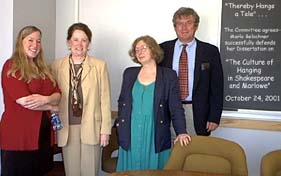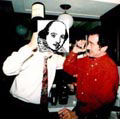More with Nihil
Neil Brennen (Spam Scone) write:
> As with your fellow-traveler Toby, when you've lost an argument, you
> end with a jade's trick. I know you of old.
What does Neil mean "lost an argument"? What argument? I thought I was having a discussion, a brain-storming session with Elizabeth.
> > > > 1. The timing: Marlowe dies, Shakespeare's born within a fortnight.
> > >
> > > Even allowing for the figurative "birth", this is evidence of nothing
> > > other than coincidence.
> >
> > It's one of many coincidences. You have enough, it becomes
> > circumstantial evidence.
>
> But as we've seen, your hand is empty. You have nothing to support
> this singular coincidence.
Which hand? In some disciplines having an empty hand is desirable.
Do you mean I have no further evidence? How do you know what evidence I have? Much of it is public domain stuff. It all adds up.
> > > > 2. Dedication promising "graver labor" (Marley and Shakespeare loved
> > > > wordplay)
> > >
> > > So does Bob Grumman, yet I've never seen him suggested as author of
> > > the Canon.
> >
> > Clever.
>
> No, not at all. I could have suggested any number of writers fond of
> wordplay. The point is this is a worthless claim in the absence of
> anything concrete.
You are too modest. It WAS somewhat clever, because BG is such an amusing example. Not sure what you mean by "anything concrete."
Tell you what, Neil, why don't you take a breather and let Elizabeth Weir say what SHE has to say. Then we might learn more than you and I are likely to, since you are "arguing" without knowledge of the poems in question. Your quiver is empty, so to speak.
> > > > 3. V&A contains echoes of H&L, including the phrase "rose cheek'd
> > > > Adonis" which appears NOT WHERE ELSE IN WORLD LITERATURE, but appears
> > > > only in V&A and in H&L (which wasn't printed until 1598) on line 93
> > > > (V&A was published in '93).
> > >
> > > We don't know that H & L didn't circulate in manuscript, or that
> > > Shakespeare didn't meet Marlowe and got the phrase from him. And
> > > there's nothing extrordinary about an unknown writer echoing a more
> > > famous one.
I like the second option better. It's cleaner. like the scene in the tavern in Shakespeare in Love, Ethel the Pirate's Daughter...but "Rose cheek'd Adonis" instead. I like it. I think our work here is done.
> > Now this bears some exploration. But to do so, it will help to read
> > Hero & Leander. Let's work out the time line, etc. for the scenario
> > you suggest.
>
> Just like a wack mind to take a dismissal and turn it into a
> "scenario". Yes, H & L could have possibly circulated in manuscript,
> as allegedly Shakespeare's "sugarded" sonnets did.
Neil, I find the phrase "wack" offensive. It implies that I follow THE ONE TRUE WACK -- Bob Grumman, which I don't. If you're in love with the homonym, however, you can think of me as a "whack," okay? Whack. with an h.
> However, as
> bookburn has pointed out, a reference to roses in the cheeks is not
> unknown in the work of other writers.
Neil, this has been hashed out before, with one or two heavyweights chipping in, and the phrase "rose cheek'd Adonis" is found only in Marlowe and Shakespeare. These are not the only parallels between them. I really don't have time to go over it all again with you personally. Read the old threads or Hero & Leander. I recommend the latter and enjoy!!! I read your short story, by the way, and the tale in H&L is similar.
And as our Ever-Posting Poet
> hinted, there's nothing remarkably poetic about the phrase.
Maybe not "remarkably" poetic, but poetic.
And I like that phrase Ever-Posting Poet. Have you used it before? Can I use it? I'll trade you one "rose cheek'd Adonis" and a "tears from sluices" for it.
> In which H&L circulated in manuscript. When do you think
> > William got hold of it. What month and year? Where did he get it? What
> > connection did he have with the Marlowe circle. I'm not saying you're
> > wrong, I'm asking you to think it through. You know how difficult it
> > is to write elegant verses, like Marlowe or Shakespeare.
>
> I know how difficult it is for me to write verse - I won't speak for
> the difficulty to Shakespeare or Marlowe. I'm sure that writing music
> is equally difficult - except perhaps for a gifted few: Mozart, etc.
>
> V&A was
> > registered in April 1593. Let's give him time to write it, along with
> > his other duties. So when did William get the ms? Bear in mind, this
> > would mean that CM's poem was completed and in circ by then.
> > > > The key evidence really is the alleged murder. If you reject Poley,
> > > > Skeres and Frizers story, based on what we now know about the men and
> > > > their activities before and immediatley following the Deptford event
> > > > (in other words, they were PROFESSIONAL LIARS! get it?) then school's
> > > > out.
> > >
> > > All antiShakespeareans (this includes you and Peter Farey) begin and
> > > end with conspiracy theories.
> >
> > Well, duh. ;-)
>
> Yes, that was a truism, wasn't it? Well, others have shot holes in
> Farey's speculations, so there's no need to trot them out again.
OF COURSE, holes can be shot in speculations. But there is pretty strong circumstantial evidence that CM's death was faked in order to deceive and appease Whitgift's sense of justice.
I'd be quite confident in taking the Marlowe case before a modern jury. In fact, if you want to debate the issue in public sometime, you're on. In Philadelphia, maybe. I've done it before, I can do it again.
But right now, you haven't read enough to do that. So let's hear what Elizabeth (who HAS read a lot) has to say, okay? So do your homework, and I'll see you in Philly, maybe.
> > > > Even WITH the murder, Marley could have written V&A, since it was
> > > > registered (anonymously) in April, weeks before CM's sudden end.
> > >
> > > Perhaps he could have. However, there is no evidence that he did so.
> >
> > Actually, the evidence is stylistic and literary. Only proves that he
> > COULD have written it, not that he did.
>
> When I say "perhaps he could have", I mean "from the technical
> standpoint he was capable of writing the poem", just as Prokofiev was
> technically capable of composing Stravinsky's Le Sacre or de Falla's
> Three Cornered Hat. I am not suggesting that he did so.
hey, i'm not a classical music expert, but those styles are very different, i guess? But the styles of Marley and the author of V&A are VERY SIMILAR. Very, very similar. See? Well you WILL see when you've read H&L.
> Now Bacon, on the other hand
> > had shown no poetic skill up til 1593, so far as I know. And William?
> > he was an "upstart crow" in 1592. Upstart indeed.
> >
> > > There is evidence that someone by the name of William Shakespeare did
> > > write V & A.
> >
> > Yes. There is. There is also evidence of writers using pseudonyms
> > before this. Martin Marprelate.
>
> Yes, but there is no evidence that a pseudonym was being used in this
> case.
There is evidence that a pseudonym MAY WELL HAVE been used in this case. Because of all the "candidates" only Marley had a MOTIVE and OPPORTUNITY to use a nom de plume. Why in the name of all that's politick would Bacon have come on to Southampton that way at that time? Shhhh. Rhetorical question, Neil. Let Elizabeth say something.
> > > > I am only offering evidence that existed in 1593 to show that Marley
> > > > probably wrote V&A. Can you do the same?
> > >
> > > Your Emperor has no clothes, Dave.
> >
> > But he has ice cream. mmmmm. ice cream.
> >
>
> As with your fellow-traveler Toby, when you've lost an argument, you
> end with a jade's trick. I know you of old.
I didn't "lose the argument" because we weren't arguing! Nor did you evince the evidence I requested. But that's okay. Give me the scoop later.
Oh Elizabeth, where are you?
When last we spoke, you were going to offer your evidence that Bacon wrote V&A under the nom de plume Shakespeare in 1593, dedicated to Southampton. You say Essex would have "bitch slapped" the younger Earl for accepting it from William, the low class actor. Only Bacon and Marley could have done it, you said. So where shall I send your ML!A secret decoder ring*, Elizabeth?
David More
*in case anyone should be mystified, the secret decoder ring is a joke, harkening back to the old Captain Midnight radio/tv show. There's probably a web page or two about it.


 If you read the post below about Neil Brennen, just today I heard from
If you read the post below about Neil Brennen, just today I heard from  There's this guy who looks like this
There's this guy who looks like this Okay, that was that... You've read this far, stay with me ...The night before I posted some verses in the "Rime Royal" newsgroup thread (HLAS) to Lorenzo, a poet from California with whom I've had friendly e-mail exchanges:
Okay, that was that... You've read this far, stay with me ...The night before I posted some verses in the "Rime Royal" newsgroup thread (HLAS) to Lorenzo, a poet from California with whom I've had friendly e-mail exchanges:

 Darby Mitchell's corker of a theory was introduced to the gang at HLAS today . . .
Darby Mitchell's corker of a theory was introduced to the gang at HLAS today . . .  I told my buddy
I told my buddy 





 Zoltan is the newest Shakespeare prof at SIU to show interest in the Marlowe=Shakespeare possibility, in particular my
Zoltan is the newest Shakespeare prof at SIU to show interest in the Marlowe=Shakespeare possibility, in particular my  I heard from Doris Wilbert today. I first met her in Canterbury, England in May, 1993, where we were both attending festivities commemorating the 400th anniversary of Marlowe's alleged death. Years later Doris published a book "Silent Shakespeare, or Marlowe Revivified" (one of the worst subtitles ever) with some new discoveries about Kit and his literary milieu, which I previewed in a previous issue of
I heard from Doris Wilbert today. I first met her in Canterbury, England in May, 1993, where we were both attending festivities commemorating the 400th anniversary of Marlowe's alleged death. Years later Doris published a book "Silent Shakespeare, or Marlowe Revivified" (one of the worst subtitles ever) with some new discoveries about Kit and his literary milieu, which I previewed in a previous issue of  I've just obtained the revised edition of Charles Nicholl's masterpiece of historical literary detective non-fiction, The Reckoning, and discovered my name in the acknowledgments in the front of the book. An entire sentence! This is it.
I've just obtained the revised edition of Charles Nicholl's masterpiece of historical literary detective non-fiction, The Reckoning, and discovered my name in the acknowledgments in the front of the book. An entire sentence! This is it.